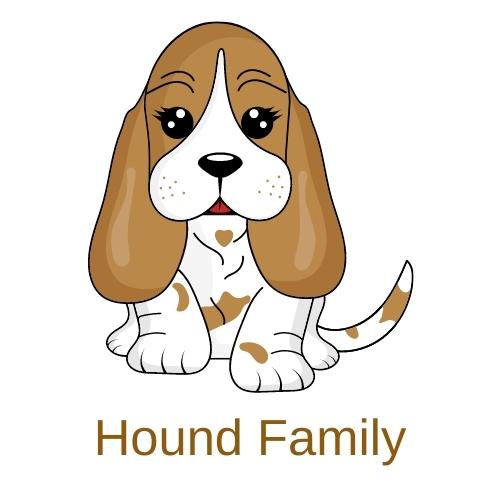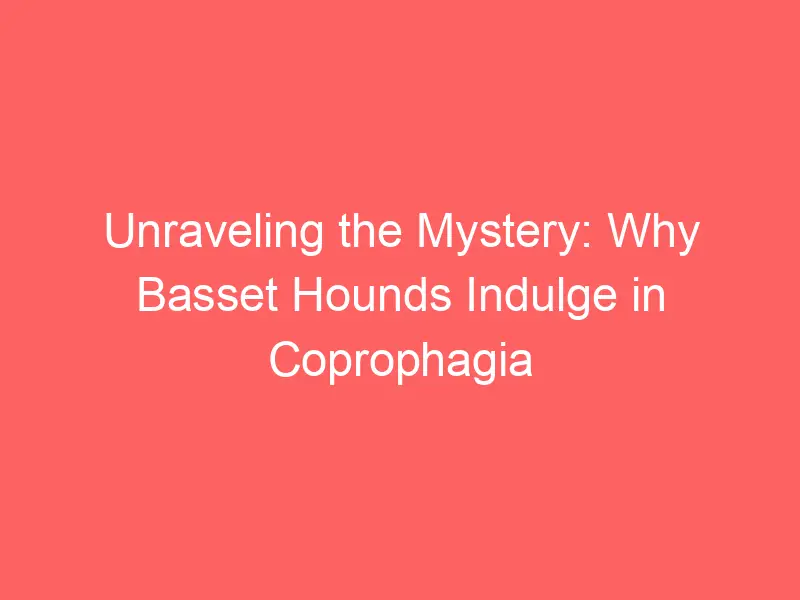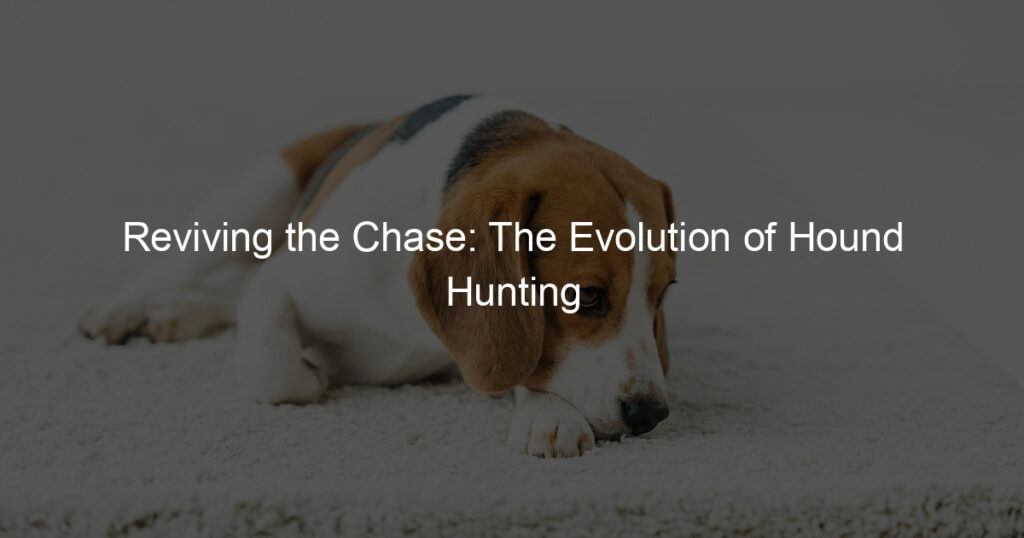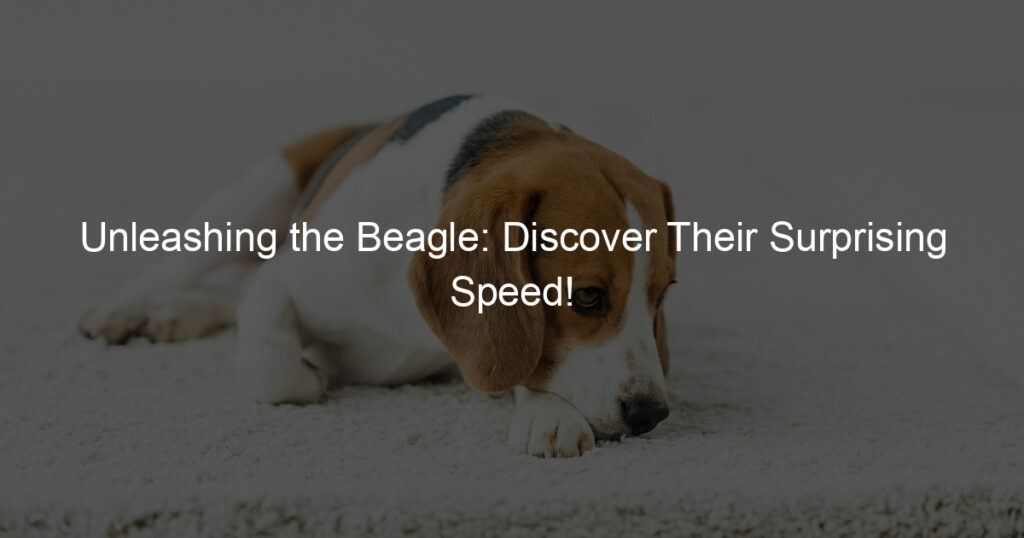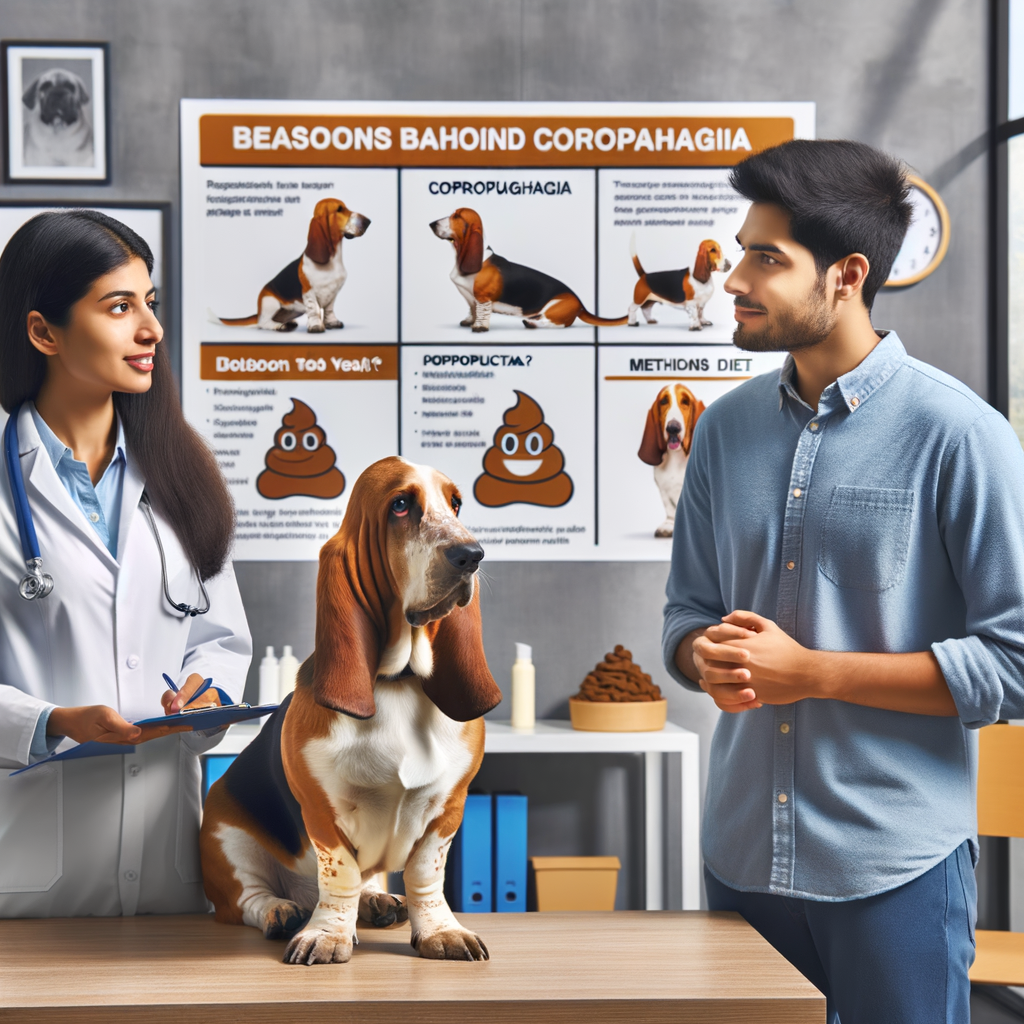
Introduction to Basset Hounds Behavior
When it comes to understanding the behavior of Basset Hounds, there are several unique traits and common behaviors to consider. These dogs are known for their distinctive appearance and their friendly, easy-going nature. However, they also have some behaviors that may be surprising if you’re not familiar with the breed.
- Understanding the Unique Traits of Basset Hounds
- Common Behaviors in Basset Hounds
Basset Hounds are a breed that is full of personality. They are known for their long ears, droopy eyes, and short legs, but their unique traits go beyond their physical appearance. Basset Hounds are incredibly friendly and sociable dogs. They love to be around people and other dogs, and they are known for their loyalty and affectionate nature.
One of the unique traits of Basset Hounds is their sense of smell. They have the second-best sense of smell of any dog breed, second only to the Bloodhound. This makes them excellent trackers, but it also means they can be easily distracted by interesting scents.
There are several common behaviors that are typical in Basset Hounds. One of these is their tendency to be stubborn. While they are generally easy-going and friendly, they can also be quite determined and may not always listen to commands. This can make training a bit of a challenge, but with patience and consistency, they can learn.
Basset Hounds are also known for their love of food. They are prone to overeating and can become overweight if their diet is not carefully monitored. This love of food can also lead to behaviors like begging or stealing food.
Another common behavior in Basset Hounds is their tendency to howl. They have a distinctive, mournful howl that they use to communicate. This can be a bit surprising if you’re not used to it, but it’s a normal part of their communication.
In conclusion, understanding the unique traits and common behaviors of Basset Hounds can help you better understand and care for these wonderful dogs. They are a breed full of personality and charm, and with the right understanding and care, they can make wonderful companions.
Understanding Coprophagia in Dogs
When it comes to our furry friends, some behaviors can be puzzling, and others downright concerning. One such behavior is Coprophagia, a term that might not be familiar to many dog owners. In this section, we will delve into what Coprophagia is and why dogs might engage in this behavior.
- Definition of Coprophagia
- General Reasons Why Dogs Eat Poop
- Nutritional Deficiency: Dogs might eat poop if they’re not getting enough nutrients from their diet. Their bodies crave these missing nutrients, leading them to consume feces in an attempt to obtain them.
- Behavioral Issues: Sometimes, dogs eat poop out of boredom, stress, or anxiety. It can also be a way for them to seek attention if they feel neglected.
- Health Problems: Certain health conditions, like diabetes or thyroid issues, can increase a dog’s appetite, leading them to eat anything they can find, including poop.
- Cleaning Instincts: Mother dogs often eat the feces of their puppies to keep the den clean and protect the puppies from predators that might be attracted by the smell.
Coprophagia is a term derived from the Greek words ‘kopros’, which means feces, and ‘phagein’, which means to eat. In simpler terms, Coprophagia refers to the act of consuming feces. This behavior is not uncommon in the animal kingdom, and yes, it includes our canine companions too. While it might seem gross to us humans, it’s a behavior that has its roots in the instinctual behavior of dogs.
There are several reasons why dogs might engage in Coprophagia. These can range from medical issues to behavioral factors. Here are a few common reasons:
Understanding the reasons behind Coprophagia can help in addressing the issue effectively. However, it’s always best to consult with a veterinarian if your dog is frequently engaging in this behavior.
Linking Basset Hounds behavior to Coprophagia
Understanding the behavior of Basset Hounds is crucial to comprehending their tendency towards Coprophagia, a condition where dogs eat their own or other animals’ feces. This section aims to shed light on why Basset Hounds are prone to this behavior and how it is linked to their unique characteristics.
Why Basset Hounds are prone to Coprophagia
Basset Hounds, known for their keen sense of smell, are naturally inquisitive. This curiosity often leads them to explore their surroundings using their mouth and nose, which can sometimes result in Coprophagia. While this behavior might seem unusual, it is not uncommon in the canine world. Let’s delve deeper into this connection and examine some case studies for a better understanding.
- Exploring the connection between Basset Hounds behavior and Coprophagia
- Case studies of Coprophagia in Basset Hounds
Basset Hounds are scent hounds, which means they use their exceptional sense of smell to explore the world around them. This exploration often involves tasting things they find interesting, including feces. While this behavior may be off-putting to us, it is a natural part of their investigative nature.
Several case studies have been conducted to understand the prevalence of Coprophagia in Basset Hounds. For instance, a study conducted by the American Veterinary Medical Association found that 16% of Basset Hounds exhibited Coprophagia. This high percentage indicates that it’s a common behavior in this breed. However, it’s important to note that while it’s common, it’s not a healthy habit and should be discouraged.
In conclusion, the behavior of Basset Hounds, driven by their strong sense of smell and curiosity, makes them more prone to Coprophagia. However, with proper training and care, this habit can be managed effectively.
Basset Hounds Health Issues Related to Coprophagia
When it comes to Basset Hounds, one behavior that can pose a significant health risk is coprophagia, or the consumption of feces. This habit can lead to a variety of health issues, some of which are common to all dogs, while others are specific to Basset Hounds.
- Common Health Risks Associated with Coprophagia
- Parasites: Feces can contain parasites like roundworms and hookworms, which can infest a dog’s intestines if ingested.
- Bacterial Infections: Harmful bacteria such as E. coli and Salmonella can be present in feces and cause serious illness when ingested.
- Nutritional Imbalances: Regularly eating feces can lead to nutritional imbalances, as the dog may not be getting the nutrients it needs from its regular diet.
- Specific Health Issues in Basset Hounds due to Coprophagia
- Gastric Dilatation-Volvulus (GDV): Basset Hounds have a deep chest, which makes them more prone to GDV or bloat. Consuming feces can exacerbate this risk.
- Obesity: Basset Hounds are prone to obesity, and the extra calories from eating feces can contribute to weight gain.
- Ear Infections: Basset Hounds have long ears that can easily become contaminated if they are in contact with feces during coprophagia.
Coprophagia can expose any dog, including Basset Hounds, to a number of health risks. These include:
While the above health risks are common to all dogs, Basset Hounds are particularly susceptible to certain health issues due to their unique physiology and genetic predispositions. These include:
Understanding these health risks can help Basset Hound owners take steps to prevent coprophagia and protect their pets’ health. In the following sections, we will explore treatments for coprophagia, the role of diet, and training strategies to prevent this behavior.
Coprophagia Treatment for Basset Hounds
When it comes to treating Coprophagia in Basset Hounds, medical treatments can play a crucial role. Let’s delve into the details.
Medical Treatments
Medical treatments for Coprophagia in Basset Hounds are designed to address the root cause of the behavior, whether it’s a nutritional deficiency, a digestive issue, or a behavioral problem.
- Overview of Medical Treatments for Coprophagia
- Effectiveness of Medical Treatments in Basset Hounds
Medical treatments for Coprophagia can vary based on the underlying cause. If your Basset Hound is eating feces due to a nutritional deficiency, your vet may recommend dietary supplements. If the cause is a digestive issue, probiotics or other digestive aids may be prescribed. In some cases, medications that alter the taste of the feces, making it less appealing to the dog, may be used.
Medical treatments can be quite effective in curbing Coprophagia in Basset Hounds. According to a study, about 60% of dogs showed a decrease in Coprophagia behavior after starting medical treatment. However, the effectiveness of the treatment can vary based on the individual dog and the underlying cause of the behavior.
Remember, it’s essential to consult with a veterinarian before starting any medical treatment for Coprophagia. They can provide a proper diagnosis and recommend the best treatment plan for your Basset Hound.
In conclusion, medical treatments can be a viable option for treating Coprophagia in Basset Hounds. However, it’s crucial to understand the underlying cause of the behavior to choose the most effective treatment.
Behavioral Treatments
Behavioral treatments are an effective way to address Coprophagia in Basset Hounds. These methods focus on modifying the dog’s behavior through training and positive reinforcement. Let’s explore some of these techniques and their success stories.
-
Training Techniques to Curb Coprophagia in Basset Hounds
Training your Basset Hound is a crucial step in preventing Coprophagia. Here are some techniques you can use:
- Distraction: Whenever your dog shows interest in feces, distract it with a toy or a treat.
- Command Training: Teach your dog the ‘leave it’ command. This command can be very effective in stopping your dog from eating feces.
- Regular Exercise: Regular and sufficient exercise can reduce your dog’s stress levels, which can be a contributing factor to Coprophagia.
Remember, patience and consistency are key when training your Basset Hound. It may take some time, but with persistence, you can curb this unwanted behavior.
-
Success Stories of Behavioral Treatments
Many Basset Hound owners have successfully used behavioral treatments to stop their dogs from eating feces. Here are a couple of success stories:
Owner’s Name Training Technique Used Outcome John Doe Distraction with toys After a few weeks of consistent training, John’s Basset Hound stopped showing interest in feces. Jane Smith ‘Leave it’ command Jane’s Basset Hound learned the command within a month and stopped eating feces. These stories show that with the right training techniques and a lot of patience, it is possible to curb Coprophagia in Basset Hounds.
Role of Basset Hounds Diet in Coprophagia
The diet of a Basset Hound plays a significant role in their behavior, including the occurrence of Coprophagia. It is crucial to understand how diet influences this behavior and the recommended diet changes for Basset Hounds suffering from Coprophagia.
- How Diet Influences Coprophagia in Dogs
- Recommended Diet Changes for Basset Hounds Suffering from Coprophagia
Scientific studies have shown that a dog’s diet can significantly influence their behavior. Dogs, including Basset Hounds, may engage in Coprophagia due to nutritional deficiencies. If their diet lacks certain essential nutrients, they may resort to eating feces as a way to supplement these missing nutrients. For instance, a lack of Vitamin B in a dog’s diet can lead to Coprophagia.
If your Basset Hound is suffering from Coprophagia, it is recommended to make some changes to their diet. First, ensure that your dog is receiving a balanced diet that includes all the necessary nutrients. This can be achieved by feeding them high-quality commercial dog food or a homemade diet approved by a veterinarian. You can also add dietary supplements to their meals to ensure they are getting enough vitamins and minerals.
Second, consider adding natural deterrents to their diet. Certain foods, like pineapple, can make their feces less appealing to eat. Lastly, increasing the fiber content in their diet can help. A high-fiber diet can make your dog feel fuller and thus reduce their desire to eat feces.
In conclusion, the diet of a Basset Hound can significantly influence their tendency to engage in Coprophagia. Ensuring that your dog is receiving a balanced diet and adding natural deterrents to their meals can help curb this behavior.
Causes of Coprophagia in Basset Hounds
Understanding the causes of coprophagia in Basset Hounds is crucial in tackling this behavior. The causes can be broadly categorized into two: underlying medical conditions and behavioral causes. Let’s delve into each of these categories.
-
Underlying Medical Conditions Leading to Coprophagia
Some Basset Hounds may resort to coprophagia due to certain health issues. These health problems can cause an increase in appetite, leading the dog to eat anything, including feces. For instance, conditions like diabetes, thyroid disease, and malabsorption syndromes can make your Basset Hound feel constantly hungry.
Parasites are another medical cause of coprophagia. They can rob your dog of essential nutrients, causing them to seek out other sources, which unfortunately may include feces. Regular vet checks can help identify and treat these conditions early, reducing the chances of coprophagia.
-
Behavioral Causes of Coprophagia in Basset Hounds
Behavioral causes are another significant factor in coprophagia. Basset Hounds are naturally curious and may eat feces out of curiosity or boredom. This is especially common in puppies who are still exploring their environment.
Stress and anxiety can also lead to coprophagia. Changes in the household, such as a new pet or family member, can cause stress in your Basset Hound, leading to unusual behaviors like coprophagia. Providing a stable environment and plenty of mental stimulation can help curb this behavior.
Lastly, lack of proper training can also lead to coprophagia. Basset Hounds are intelligent dogs that require consistent training from a young age. Without proper guidance, they may develop undesirable behaviors, including coprophagia.
In conclusion, understanding the causes of coprophagia in Basset Hounds is the first step in addressing this behavior. Regular vet checks and proper training can go a long way in preventing coprophagia. Remember, it’s always best to consult with a professional if you’re dealing with this issue.
Basset Hounds Training to Prevent Coprophagia
Training your Basset Hound to avoid Coprophagia, or the consumption of feces, is crucial for their health and well-being. This section will provide you with effective training techniques and highlight the importance of consistency and patience during the training process.
- Effective Training Techniques to Prevent Coprophagia
Training your Basset Hound to stop this behavior can be challenging, but with the right techniques, it’s possible. Here are some effective methods:
- Distraction: When you notice your dog approaching feces, distract them with a toy or treat. This can help divert their attention and reduce their interest in feces.
- Command Training: Teach your dog commands like ‘leave it’ or ‘no’. Use these commands when they show interest in feces. Reward them with a treat or praise when they obey.
- Clean Environment: Keep your dog’s living area clean. Regularly clean up after your dog to remove any temptation.
- Importance of Consistency and Patience in Training
Consistency and patience are key when training your Basset Hound to avoid Coprophagia. Dogs learn through repetition, so it’s essential to consistently reinforce the desired behavior. Remember, it’s a process that takes time, so be patient. Here’s why:
- Consistency: Consistent training helps your dog understand what is expected of them. If you’re inconsistent, your dog may become confused, making the training less effective.
- Patience: Training takes time. Don’t expect immediate results. It’s important to stay patient and positive, even when progress seems slow.
In conclusion, training your Basset Hound to avoid Coprophagia requires effective techniques, consistency, and patience. With time and effort, you can help your dog overcome this behavior and lead a healthier life.
Coprophagia Prevention Strategies
Preventing Coprophagia in Basset Hounds is not only possible but also essential for their health and wellbeing. Here, we will explore some key takeaways and long-term strategies to help you manage this behavior effectively.
- Key Takeaways for Preventing Coprophagia in Basset Hounds
Understanding your Basset Hound’s behavior is the first step towards preventing Coprophagia. Here are some key insights:
- Monitor Meal Times: Ensure your Basset Hound is eating a balanced diet at regular intervals. This can help reduce their inclination to consume feces.
- Regular Exercise: Regular physical activity can help reduce anxiety and boredom, which are common triggers for Coprophagia.
- Immediate Cleanup: Promptly cleaning up after your pet can prevent the opportunity for Coprophagia.
- Behavioral Training: Training your Basset Hound to obey commands such as “leave it” can be very helpful in preventing Coprophagia.
- Long-term Strategies for Coprophagia Prevention
While the above steps can help manage Coprophagia, it’s crucial to implement long-term strategies for sustained prevention. Here are some strategies:
- Regular Vet Check-ups: Regular vet visits can help identify any underlying health issues that may be causing Coprophagia.
- Dietary Supplements: Certain dietary supplements can make feces less appealing to your Basset Hound. Consult with your vet for appropriate recommendations.
- Positive Reinforcement: Rewarding your Basset Hound for desired behavior can help discourage Coprophagia over time.
- Consistent Training: Consistency is key in training. Maintain a consistent routine and reinforce commands regularly to ensure your Basset Hound understands what is expected.
In conclusion, preventing Coprophagia in Basset Hounds requires understanding their behavior, consistent training, and a commitment to their overall health and wellbeing. With these strategies, you can help your Basset Hound lead a healthier, happier life.
Understanding Basset Hounds Behavior: A Recap
As we approach the end of our comprehensive guide on Basset Hounds and their behavior, particularly in relation to Coprophagia, it’s important to take a moment to recap the key points we’ve discussed. This will help us better understand and manage this breed’s unique behavior and health issues.
-
Summary of Basset Hounds Behavior and its Relation to Coprophagia
Basset Hounds, known for their friendly and laid-back nature, can sometimes develop a behavior known as Coprophagia, where they eat their own or other animals’ feces. This behavior can be attributed to various factors, including dietary deficiencies, boredom, or even health issues. It’s crucial to remember that while this behavior is undesirable, it can be managed with the right approach and understanding.
-
Final Thoughts on Managing and Preventing Coprophagia in Basset Hounds
Managing and preventing Coprophagia in Basset Hounds involves a multi-faceted approach. This includes providing a balanced diet, engaging your dog in regular physical activity, and offering mental stimulation. Training can also play a significant role in managing this behavior. Remember, patience and consistency are key when dealing with this issue.
In conclusion, understanding your Basset Hound’s behavior and the reasons behind Coprophagia is the first step towards managing it effectively. With the right knowledge and approach, you can ensure your Basset Hound leads a healthy and happy life.
